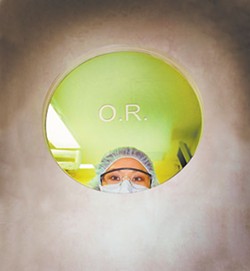If these walls could talk
State regulators find problems at a Charlotte abortion clinic
By Karen ShugartA Charlotte abortion clinic is under state scrutiny after regulators found evidence of conditions one official said placed patients in "immediate jeopardy."
Now back open, A Preferred Women's Health Center was shut down several days in February and was threatened with permanent closure after its first state inspection in more than three years revealed what investigators deemed disturbing problems. "If we feel that the patient's health and safety is in immediate jeopardy, then that's about as serious as it gets," says Jeff Horton, chief operating officer for N.C. Division of Facility Services, which regulates clinics.
The clinic on Latrobe Drive, one of three clinics in Charlotte that performs abortions, had its operating certificate downgraded to "provisional." The status change means its license could be yanked or -- more likely -- restored to full status once inspectors are satisfied with changes at the clinic.
The clinic's chief administrator says the problems that DFS found are the result of misunderstandings and the deliberate ploys of former staff to get another employee fired and to undermine her mission to help women. Most deficiencies, she said, were related to paperwork, not patient care.
The DFS inspectors' report, however, found evidence of disturbing outcomes for several patients.
• Emergency medical technicians found a 25-year-old woman lying on the floor when they responded to a call on Feb. 1. The emergency services report said she was "laying on extremely dirty floor without any type of barrier between patient and floor. Patient has bled on floor and self." That was nearly three hours after clinic records indicated she'd supposedly been discharged in good condition -- a discrepancy a nurse was unable to explain to DFS. Nor could the nurse explain why the patient was on the floor.
• A 33-year-old patient, 17 weeks pregnant, underwent an emergency hysterectomy at a Charlotte hospital after complications developed during a second-trimester abortion at the clinic on July 19, 2006. DFS investigators found indication that records "may have been intentionally destroyed," though they later reappeared without nursing notes missing.
• After problems developed during a second-trimester abortion on Nov. 7, 2006 a 15-year-old girl spent a week in a hospital, where doctors performed a hysterotomy (a Caesarean section), repaired a uterine perforation, removed part of her colon, and installed a colostomy bag. According to DFS records, the doctor took a long time to call 911 after a nurse suggested calling an ambulance. Nor did he want staff to talk with girl's mom who was in the waiting room, according to the DFS report.
• Three days after a 24-year-old patient was transferred to a hospital after an unsuccessful second-trimester abortion, a nurse told DFS inspectors she couldn't remember the patient. Emergency services records indicated the ambulance left on Feb. 6 (2007) with the woman 47 minutes before clinic records indicated she'd had her blood pressure taken.
The inspection also documented serious violations of policy and law: A doctor performed an abortion one icy morning without a nurse present. Patient records weren't adequately kept -- and some records appeared intentionally destroyed. Some equipment lacked evidence of proper maintenance. Patients' vital signs weren't recorded accurately. Patients weren't told if doctors had admitting privileges at nearby hospitals.
Lois Turner, the clinic's chief administrator, says A Preferred Women's Health Center operates according to high standards. She acknowledges mishaps but says her clinic has far lower complication rates than national average.
"We're held to such a higher standard than any other doctor's office or any other outpatient surgical facility," she says emphatically. "We're held to higher standards and that's OK -- I meet them. But we can be put in a bad light with the wrong person."
What happened when DFS interviewed staff in February, she says, was a set up by an employee with personal grudges who wanted a newer hire fired. She believes a staffer called in the complaint. She was absent when DFS inspected the clinic -- a decision she regrets.
The missing personnel records? Their absence was likely due to a disgruntled employee.
The patient that ambulance workers claim they found on a dirty floor in her own blood? The so-called dirty floors were actually clean floors made rusty by zealous cleaning with bleach. The patient, she says, may have tried to get up while a nurse swooned in a different room. "We had two emergencies going on at the same time ... apparently, it was just an unfortunate thing. It could happen anywhere at any time," Turner says.
The incorrectly charted patient records? Simply human error caused by doctors who were focused on patients, not paperwork. "If you're not sitting there with a stenographer, there can be charting errors," she says. "I don't think there was anything more than a doctor not doing it until a couple of days later."
A Preferred Women's Health Center's troubles with the state began Feb. 5, when DFS received a confidential complaint about the quality of care. Two inspectors, both registered nurses, inspected clinic records and interviewed employees on Feb. 8 and Feb. 9.
All services were suspended Feb. 14, and fewer than 10 days later, DFS sent noticed they intended to shut down the clinic.
"It is determined by our office that your facility's violations with the above Statutes and Rules endanger the health, safety and welfare of patients receiving services by the clinic. The Department, therefore, intends to revoke your certificate," reads the notice dated Feb. 23.
In February, the facility submitted its plan for improvement and reopened. DFS on March 27 notified the clinic it was downgrading its certificate status. Horton says state regulators haven't suspended an abortion clinic's license since the late 1990s, when Women's Choice of North Carolina in Greensboro temporarily was shut down -- a move that stemmed primarily from that facility's failure to ensure a back-up physician was on call. He says politics "absolutely" do not play a role in regulatory decisions.
Normally, A Preferred Women's Health Center's Charlotte office performs "about average" on state inspections, Horton says. A November 2001 visit, for example, yielded no problems, nor did a March 2002 visit. (After finding problems with the Charlotte office, state inspectors toured the Raleigh location but found no significant problems, he says.)
DFS typically inspects clinics about every 18 months, depending on agency resources, Horton says. But the clinic on Latrobe Drive hadn't seen a state inspector cross its threshold since November 2003.
Before Roe v. Wade, many people who favored liberalizing abortion laws did so in no small part because they didn't want women to die or suffer injury from back-alley abortions. As long as women needed or sought abortions, women should have access to mainstream, sound medical care.
Today, an estimated 43 percent of women in the United States will have at least one abortion by the time they are 45 years old, according to the Alan Guttmacher Institute, the research arm of Planned Parenthood. But because of secrecy and stigma associated with the procedure, those of us who get abortions are reluctant to ask primary care doctors, friends or relatives for advice when seeking facilities. When women encounter a problem, they may be less likely to make waves. "Abortion clinics are one facility we typically don't get many complaints about," says Horton of DFS. "It's probably a variety of reasons, but one could be that these women don't feel comfortable complaining and therefore don't tell anybody."
From debates over abortion and breast cancer (the mainstream medical community says there is no link) to claims that many women who have the procedure suffer a special kind of grief called post-abortion syndrome, the safety of the procedure has long been debated.
Opponents of legalized abortion often decry clinics as "abortion mills," and some groups encourage women "hurt by abortion" to file lawsuits against clinics. Meanwhile, abortion-rights supporters say clinics are regulated more stringently than any other category of medical care. Major medical groups say abortion is a safe procedure that causes problems for few women.
Abortion during the first and second trimesters of pregnancy poses lower risk than carrying to term, according to the American College of Obstetricians and Gynecologists. Fewer than one in 100 women has complications from an early abortion. Up to two in 100 women have complications from a later abortion. About 88 percent of women who get abortions are less than 13 weeks pregnant, according to the National Abortion Federation.
Abortion-rights supporters, however, acknowledge it's hard to find doctors to perform abortions due to harassment, pressure and a lack of support even within the medical community, which generally supports abortion rights.
There is a powerful stigma, says Turner. "You're ostracized by your professional community. You wonder why this person doesn't give you this loan at the bank or why their kids can't spend the night with your kids. Everything is adversely affected."
Fewer than 2,000 doctors in the United States perform abortions, according to the Alan Guttmacher Institute. That number has been shrinking, but abortion-rights groups are trying to reverse the trend.
Many medical school graduates aren't taught how to perform abortions, says Lois Backus, executive director of Medical Students for Choice, which has chapters in 127 Canadian and U.S. medical schools and more than 10,000 members. Backus believes the shrinking pool of doctors may stem more from medical school training than stigma; most abortions are performed in clinics, while doctors train primarily in hospitals. The organization is working to change that, she says, but "it's still very difficult for medical students to work within the system to introduce topics like family planning and abortion care."
Turner says she wanted to help women when she opened A Preferred Women's Health Center in 1999, a year after opening a facility in Raleigh. She had been a teacher before opening the clinic with her husband, its medical director.
She says a cousin's hidden pregnancy more than 30 years ago showed her the importance of access to legal abortion. The 17-year-old cousin's unintended pregnancy created tumult within the family, and the baby died in its crib 10 months after birth. The cousin, never the same again, committed suicide years later, Turner says.
"I got into this business for two reasons: I care, and I can do it better," Turner says. "I tell the people that work for me, everybody that you don't meet their needs is somebody you could kill down the road. It might not be now, but it could be later." Her voice breaks.
The clinic is the only one in Charlotte certified by the National Abortion Federation. Turner says a NAF representative found no significant problems during a July 2006 and made only three minor recommendations. A NAF spokeswoman, citing confidentiality rules, would not confirm the date of the clinic's last inspection.
A tour of the clinic during an interview arranged the day before showed a calm, clean an orderly facility. Turner says the clinic has never been sued, a statement backed up by a review of North Carolina court records. Some doctors who work there, however, have.
Dr. Jonathan Weston, who DFS says performed an abortion without a nurse present as required, has not been signed up for shifts since the state agency visited. He did not return a call seeking comment. Turner says he won't be returning, though she couldn't find he did anything "substantially wrong. I have to have confidence and my staff has to have confidence in who they work with. And it's a shame. Because he's been helping women for a very long time."
Complaints to the N.C. Medical Board are confidential unless public action is taken. Though the board has sanctioned Weston more than 15 years ago, his license currently is active.
The clinic's license, however, is still provisional. Horton says that could change if inspectors are pleased with what they see on their next unannounced visit. He said it's likely they will be subject to increased scrutiny because of the deficiencies.
"It seemed that there was just a lack of leadership there," he says. "No one was really kind of in charge, and I think that was one of the main issues there."
Speaking of 5.00000
-
A Family Affair
Dec 12, 2007 -

What If the Water Runs Out?
Dec 12, 2007 -
Body Talk
Dec 12, 2007 - More »
Latest in News Feature
More by Karen Shugart
-
Mecklenburg and beyond ...
Feb 10, 2009 -
Mecklenburg and beyond ...
Feb 9, 2009 -
Mecklenburg and beyond ...
Feb 6, 2009 - More »
Calendar
-

Queen Charlotte Fair @ Route 29 Pavilion
-

NEW WINDOW GALLERY-Pat Rhea-ACRYLIC PAINTINGS-April 05-30 2024 VALDESE, NC 28690 @ New Window Gallery/Play It Again Records
- Through April 30, 12 p.m.
-

TheDiscountCodes
-

Wine & Paint @ Blackfinn Ameripub- Ballantyne
-

Face to Face Foundation Gala @ The Revelry North End










